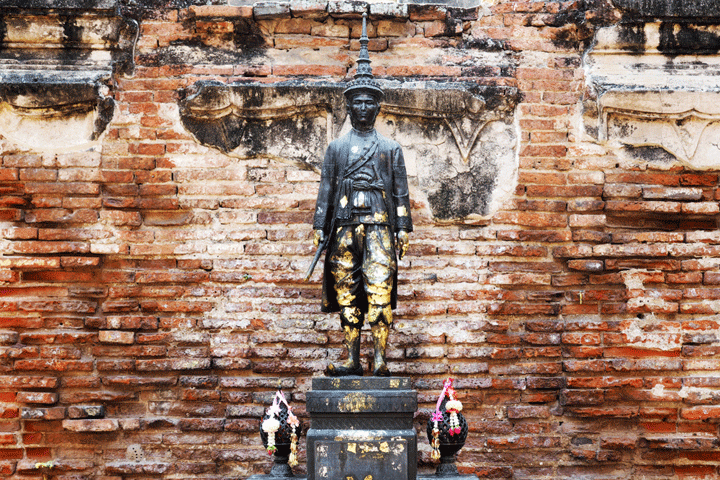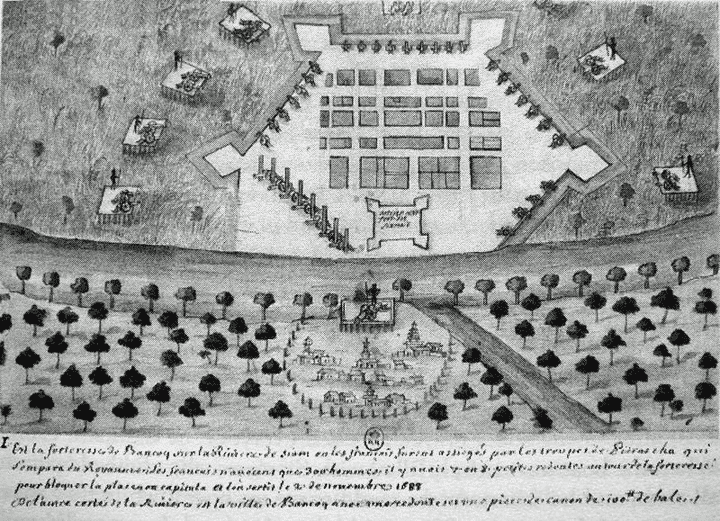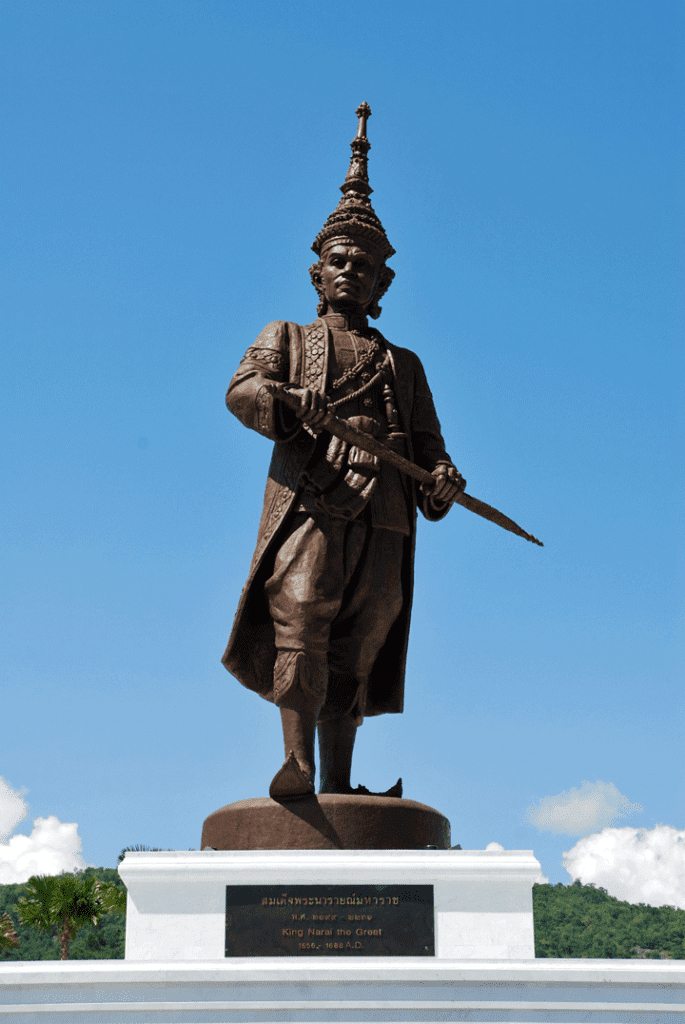
King Narai
Historically, large areas in what is now the extreme northwest of the French Republic once belonged to the Low Countries not so long ago. South Flanders or French Flanders, Artois and Picardy with powerful cities such as Lille (Lille), Atrecht (Arras) and Cambrai (Cambrai) were once jewels in the crown of the Seventeen Provinces. From this region came in the last half of the 17e century the now totally forgotten Daniel Brouchebourde, a man who was personal physician to two Siamese kings.
The Siamese King Divers those between 1656 and 1688 Ayutthaya ruled has appealed to foreigners for almost the entire period of his reign. It was Persian mercenaries who brought him to power, he welcomed the English merchants who had been expelled from Cambodia and had them set up a trading post of the East India Company, and it was common knowledge that the pro-French Greek intriguer Constantine Paulkhon was his chief adviser . Matters that the other farang as the Portuguese, Spaniards and especially the Dutch of the Dutch East India Company (VOC) saw happen with sorrow. After the VOC After flexing his muscles and blocking the Chao Phraya with warships, Narai realized he had little choice but to keep the Dutch on friendly terms. When relations between the VOC and the king had improved, he regularly asked the VOC to send him professionals who could assist him with their Western expertise. For example, in 1668 the VOC sent a pile (gunner) and one crust maker to the Siamese Court. In the course of the following years, an enameller, a goldsmith and a master builder followed from Batavia to Ayutthaya, among others.

Siege of French troops in Bangkok 1688
In 1672, Daniel Brouchebourde, a Franco-Flemish man, was appointed personal physician to the Siamese king. For a while he had practiced as a surgeon-surgeon in Sedan, a city in the north-east of France, before he started working as a ship's doctor in the Amsterdam Chamber of the VOC around 1655. Perhaps he was a Protestant, perhaps a Huguenot, who had sought protection in the United Provinces after the French King Louis XIV launched a campaign a few years earlier to force the Protestants back to the Roman sheepfold. The name Brouchebourde probably refers to Broekburg, a place near Dunkirk and this only substantiates this thesis because Broekburg, which was on the front line of the Franco-Spanish wars of succession, had sided with Stadtholder William II of Orange in that period. From 1659 Brouchebourde was chief surgeon of the VOC in Nakhon Sithammarat and was married to a Siamese. Shortly before 1669 he moved with his wife to Ayutthaya. His skills as a physician soon penetrated court circles and after he had successfully treated a few courtiers, King Narai asked the VOC in Batavia if he could lend the physician. A request that the VOC leadership in Batavia gladly accepted, because a fluent Siamese-speaking employee who lived in the highest court circles was always a nice bonus…
Daniel quickly managed to gain the trust of the monarch. However, this did not prevent him from becoming involved - perhaps against his will - in what would later be known in Thai history books as the Revolution of 1688'. In that year the king's health was declining and the French, spurred on by Paulkhon, tried to take advantage of the resulting power vacuum and expand their power base by sending troops and occupying the fortresses in Bangkok and Mergui. A number of Siamese notables, led by the influential courtier Phetracha, the captain of the royal regiment of elephants and Princess Si Suphan, a half-sister of the king, saw this as an invasion of Siamese sovereignty and culled Paulkhon and a number of his Siamese allies, including the princes Mom Pi, Noi and Aphaitot out of the way. The French became militarily called to order and forced their troops to leave the country. In this way, after Narai's death, Phetracha was able to ascend the throne without much opposition.
From the VOC sources, Daniel appears as someone who played no important role in the constitutional crisis of 1688, but as a Westerner trusted and valued by all parties at a time when almost all Westerners were under suspicion. French sources, however, tap into a completely different vein. There Daniel Brouchebourde is a schemer who, together with the Dutchmen, was in cahoots with Phetracha. The VOC doctor not only survived the crisis of 1688 unscathed, but even came out of this internal conflict strengthened. King Phetracha even awarded him the honorary title in gratitude for services rendered Okphra Phaetosot. He died in Ayutthaya in 1697. He left the not inconsiderable inheritance of 1.582 guilders. An inheritance, which - according to Siamese law - went to the Siamese crown. Daniels' heirs were all born of conjoined women and therefore conjoined, so they had to abide by conjoined jurisprudence.

King Narai
His eldest son Mozes had not only followed in Daniels' footsteps and worked as a doctor at court, but he also had a lucrative side job. From 1688 he was, for three years, the bookkeeper of the VOC factory in Ayutthaya. In 1690-1691, when his three-year contract with the VOC had expired, Pieter Van den Hoorn, the then chief merchant of the VOC in Siam, wished to extend it. Moses had made himself indispensable to the VOC as an interpreter and mediator. However, this was against the will of Mozes and it led to a heated conflict in which Van den Hoorn threatened to banish the doctor to Batavia. Daniel and Mozes then turn to the Phraklang, the minister responsible for contacts with the foreigners, for protection. The Phraklang informed the VOC that Moses was not only born in Siam from a Siamese woman, but was also one of the king's personal physicians and was therefore a Siamese subject. It was now even clear to the VOC that the Brouchebourdes could count on high protection… Because of the undeniable usefulness of the family to the VOC, it did not take long before the folds were ironed out and from 1709 Moses received a monthly wage from the VOC of 30 guilders as a reward for hisloyaltyto the Company…
Another son, Paulus Brouchebourde, was also employed by the Court and the VOC as an assistant physician. In 1692 he requested through the chief merchant Joannes van Wagensvelt to be promoted to surgeon. A request, which the VOC refused to comply with for unknown reasons. Two years later, at the end of 1694, Paulus informed the VOC that he was leaving the service. He engaged himself as a captain in the Siamese fleet and was given command of a ship with which he sailed to India, among other places.
Daniel's third son, Pieter was the Second Taelman or interpreter of the VOC. He came to a dramatic end in 1713. In that year Siamese officials discovered that the VOC had not only protected a few opium traders, but that opium was also being traded in the immediate vicinity of the VOC factory. During a raid on this opium shack, Pieter Brouchebourde was killed by men who were in the service of the crown prince Phon, later king Borommakot. As a reprisal for the possible VOC involvement, the Siamese froze all VOC trade in the empire for two months. Not entirely unjustly, Dirck Blom, the then chief merchant of the VOC in Ayutthaya, accused Peter 'scareless behavior'...
It is known that Mozes Brouchebourde had two sons from a marriage to a Mon woman. No documents have survived about Philemon other than a mention as a doctor at the Siamese Court. His brother Jeremias Brouchebourde has left traces. A letter from 1711 shows that he was employed by the VOC and that it was hoped that he would soon start working for them as an interpreter. Not surprising, because testimonials show that Jeremias spoke Siamese, Mon, French and Portuguese in addition to Dutch. When father Mozes died in 1724, Jeremias succeeded him in his position as personal physician to the king. Jeremias asked the VOC to pay him, just like his father, but the chief merchant Prageman informed the governor-general in Batavia that he doubted whether Jeremias could mean much to the VOC, after which his request was promptly rejected.
The last mention of these brothers dates from 1732. In that year they appealed to the VOC to send their chief surgeon from Batavia when it turned out that they were unable to cure the terminally ill King Thai Sa. Apparently they were no longer among the monarch's medical favorites because the brothers complained that he had become too involved with Vietnamese and Chinese quacks...
The Brouchebourdes disappeared in the mists of history, but perhaps descendants of this enterprising doctor still live in Thailand today... In 1990, Dhiravat na Pombejra wrote an interesting paper about Daniel and his offspring.


Nice story again.
I always look for that meaning of the Thai words, otherwise I forget everything.
Okphra Phaet-osot, the honorific given to Daniel by the Thai king. Okphra is almost certainly a high, non-veinous official title. usually called phraya พระยา (tones high middle, or phaya). (cf. the Chao Phraya), phaet is แพทย์ (tone falling) 'doctor' and osot (tone middle low) โอสถ means medicine.
An interesting story where Daniel apparently had several wives.
It is also remarkable that the VOC was involved in the opium trade. which the Siamese don't mind
appreciated!
Dear Tino, at the time of Narai, according to my research, the following official titles were in use: Okphan, Okmun, Okkhun, Okluang, Okphra, Okya and Chaophya… Daniel's sons and grandsons also bore the Okphra title.
Indeed. From bottom to top Phan (one thousand), Muun (ten thousand), Khun (not sir, ma'am but with a rising tone), Luang, Phra, Phraya and Chao Phraya. Any idea what that "ok" means for it?
And now for the beautiful actually in the Thai script, there is no misunderstanding about the word or the pronunciation.
Dear Lung Jan
This is very interesting article. I have to admit : I am French-Flemish but I had never heard of Daniel Brouchebourde. Are there any books or resources about this man?
Anyway, well written!
Wido Bourel